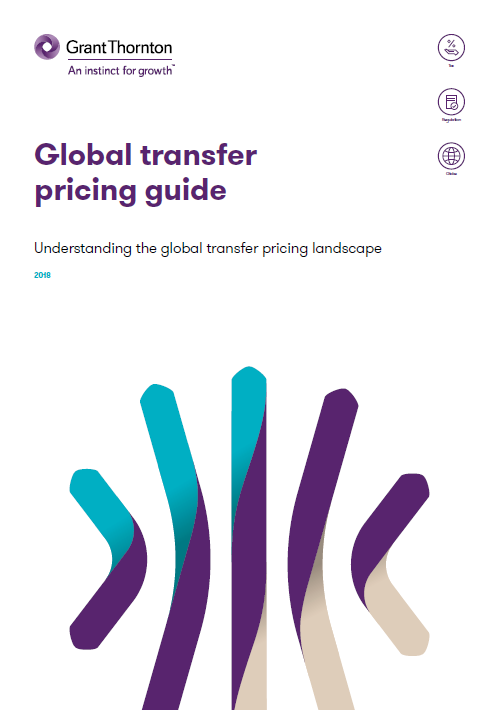-
Other audit services
We help clients with the application and use of foreign financial aid of EU and other funds and help prepare financial reports.
-
Audit calculator
The calculator will answer if the company's sales revenue, assets or number of employees exceed the limit of an inspection or audit.
-
Payroll and related services
We perform payroll accounting for companies whether they employ a few or hundreds of employees.
-
Tax accounting
Grant Thornton Baltic's experienced tax specialists support accountants and offer reasonable and practical solutions.
-
Reporting
We prepare annual reports in a timely manner. We help to prepare management reports and various mandatory reports.
-
Consolidation of financial statements
Our experienced accountants and advisors help you prepare consolidation tables and make the consolidation process more efficient.
-
Consultancy and temporary staff
Our experienced specialists advise on more complex accounting transactions, rectify poor historic accounting, and offer the temporary replacement of an accountant.
-
Outsourced CFO service
Our CFO service is suitable for companies of all sizes and in all industries. We offer services to our clients in the required amount and competences.
-
Assessment of accounting processes
We help companies to implement accounting practices that are in compliance with local and international standards.
-
Accounting services for small businesses
We offer affordable service for small businesses. We help organize processes as smartly and cost-effectively as possible.
-
Cryptocurrency accounting
We keep up with blockchain technology to serve and advise crypto companies. We are supported by a network of colleagues in 130 countries.
-
Trainings and seminars
Our accountants have experience in all matters related to accounting and reporting. We offer our clients professional training according to their needs.

-
Business advisory
We offer legal support to both start-ups and expanding companies, making sure that all legal steps are well thought out in detail.
-
Fintech advisory
Our specialists advise payment institutions, virtual currency service providers and financial institutions.
-
Corporate advisory
We advise on legal, tax and financial matters necessary for better management of the company's legal or organizational structure.
-
Transaction advisory
We provide advice in all aspects of the transaction process.
-
Legal due diligence
We thoroughly analyze the internal documents, legal relations, and business compliance of the company to be merged or acquired.
-
In-house lawyer service
The service is intended for entrepreneurs who are looking for a reliable partner to solve the company's day-to-day legal issues.
-
The contact person service
We offer a contact person service to Estonian companies with a board located abroad.
-
Training
We organize both public trainings and tailor made trainings ordered by clients on current legal and tax issues.
-
Whistleblower channel
At Grant Thornton Baltic, we believe that a well-designed and effective reporting channel is an efficient way of achieving trustworthiness.

-
Business model or strategy renewal
In order to be successful, every company, regardless of the size of the organization, must have a clear strategy, ie know where the whole team is heading.
-
Marketing and brand strategy; creation and updating of the client management system
We support you in updating your marketing and brand strategy and customer management system, so that you can adapt in this time of rapid changes.
-
Coaching and development support
A good organizational culture is like a trump card for a company. We guide you how to collect trump cards!
-
Digital services
Today, the question is not whether to digitize, but how to do it. We help you develop and implement smart digital solutions.
-
Sales organisation development
Our mission is to improve our customers' business results by choosing the right focuses and providing a clear and systematic path to a solution.
-
Business plan development
A good business plan is a guide and management tool for an entrepreneur, a source of information for financial institutions and potential investors to make financial decisions.
-
Due diligence
We perform due diligence so that investors can get a thorough overview of the company before the planned purchase transaction.
-
Mergers and acquisitions
We provide advice in all aspects of the transaction process.
-
Valuation services
We estimate the company's market value, asset value and other asset groups based on internationally accepted methodology.
-
Forensic expert services
Our experienced, nationally recognized forensic experts provide assessments in the economic and financial field.
-
Business plans and financial forecasts
The lack of planning and control of cash resources is the reason often given for the failure of many businesses. We help you prepare proper forecasts to reduce business risks.
-
Outsourced CFO service
Our CFO service is suitable for companies of all sizes and in all industries. We offer services to our clients in the required amount and competences.
-
Reorganization
Our experienced reorganizers offer ways to overcome the company's economic difficulties and restore liquidity in order to manage sustainably in the future.
-
Restructuring and reorganisation
We offer individual complete solutions for reorganizing the structure of companies.
-
Corporate taxation
We advise on all matters related to corporate taxation.
-
Value added tax and other indirect taxes
We have extensive knowledge in the field of VAT, excise duties and customs, both on the national and international level.
-
International taxation
We advise on foreign tax systems and international tax regulations, including the requirements of cross-border reporting.
-
Transfer pricing
We help plan and document all aspects of a company's transfer pricing strategy.
-
Taxation of transactions
We plan the tax consequences of a company's acquisition, transfer, refinancing, restructuring, and listing of bonds or shares.
-
Taxation of employees in cross-border operations
An employee of an Estonian company abroad and an employee of a foreign company in Estonia - we advise on tax rules.
-
Tax risk audit
We perform a risk audit that helps diagnose and limit tax risks and optimize tax obligations.
-
Representing the client in Tax Board
We prevent tax problems and ensure smooth communication with the Tax and Customs Board.
-
Taxation of private individuals
We advise individuals on personal income taxation issues and, represent the client in communication with the Tax and Customs Board.
-
Pan-Baltic tax system comparison
Our tax specialists have prepared a comparison of the tax systems of the Baltic countries regarding the taxation of companies and individuals.
-
Internal audit
We assist you in performing the internal audit function, performing internal audits and advisory work, evaluating governance, and conducting training.
-
Internal Audit in the Financial Services Sector
We provide internal audit services to financial sector companies. We can support the creation of an internal audit function already when applying for a sectoral activity license.
-
Audit of projects
We conduct audits of projects that have received European Union funds, state aid, foreign aid, or other grants.
-
Prevention of money laundering
We help to prepare a money laundering risk assessment and efficient anti-money laundering procedures, conduct internal audits and training.
-
Risk assessment and risk management
We advise you on conducting a risk assessment and setting up a risk management system.
-
Custom tasks
At the request of the client, we perform audits, inspections and analyzes with a specific purpose and scope.
-
External Quality Assessment of the Internal Audit Activity
We conduct an external evaluation of the quality of the internal audit or provide independent assurance on the self-assessment.
-
Whistleblowing and reporting misconduct
We can help build the whistleblowing system, from implementation, internal repairs and staff training to the creation of a reporting channel and case management.
-
Information security management
We provide you with an information security management service that will optimise resources, give you an overview of the security situation and ensure compliance with the legislation and standards.
-
Information security roadmap
We analyse your organisation to understand which standards or regulations apply to your activities, identify any gaps and make proposals to fix them.
-
Internal audit of information security
Our specialists help detect and correct information security deficiencies by verifying an organization's compliance with legislation and standards.
-
Third party management
Our specialists help reduce the risks associated with using services provided by third parties.
-
Information security training
We offer various training and awareness building programmes to ensure that all parties are well aware of the information security requirements, their responsibilities when choosing a service provider and their potential risks.
-
Digital Operational Resilience Act (DORA)
We will help you create a DORA implementation model that meets your company's needs and ensures that you meet the January 2025 deadline.

-
ESG advisory
We help solve issues related to the environment, social capital, employees, business model and good management practices.
-
ESG audit
Our auditors review and certify sustainability reports in line with international standards.
-
Sustainable investments
We help investors conduct analysis of companies they’re interested in, examining environmental topics, corporate social responsibility and good governance practices.
-
Sustainable tax behaviour
Our international taxation specialists define the concept of sustainable tax behaviour and offer services for sustainable tax practices.
-
ESG manager service
Your company doesn’t necessarily need an in-house ESG manager. This role can also be outsourced as a service.

-
Recruitment services – personnel search
We help fill positions in your company with competent and dedicated employees who help realize the company's strategic goals.
-
Recruitment support services
Support services help to determine whether the candidates match the company's expectations. The most used support services are candidate testing and evaluation.
-
Implementation of human resource management processes
We either assume a full control of the launch of processes related to HR management, or we are a supportive advisory partner for the HR manager.
-
Audit of HR management processes
We map the HR management processes and provide an overview of how to assess the health of the organization from the HR management perspective.
-
HR Documentation and Operating Model Advisory Services work
We support companies in setting up HR documentation and operational processes with a necessary quality.
-
Employee Surveys
We help to carry out goal-oriented and high-quality employee surveys. We analyse the results, make reports, and draw conclusions.
-
HR Management outsourcing
We offer both temporary and permanent/long-term HR manager services to companies.

-
Digital strategy
We help assess the digital maturity of your organization, create a strategy that matches your needs and capabilities, and develop key metrics.
-
Intelligent automation
We aid you in determining your business’ needs and opportunities, as well as model the business processes to provide the best user experience and efficiency.
-
Business Intelligence
Our team of experienced business analysts will help you get a grip on your data by mapping and structuring all the data available.
-
Cybersecurity
A proactive cyber strategy delivers you peace of mind, allowing you to focus on realising your company’s growth potential.
-
Innovation as a Service
On average, one in four projects fails and one in two needs changes. We help manage the innovation of your company's digital solutions!

Author: Marko Rebane
Grant Thornton has released a new guide to help international entrepreneurs navigate transfer pricing regulations in different countries.
International taxation and related regulations are undergoing a period of change. The changes are among the most significant and radical seen in years. The main impetus for countries becoming more exacting in their approach to taxation of international transactions came from the OCED’s BEPS action plan to combat base erosion and profit shifting. The action plan is already being implemented by over 100 tax jurisdictions.
Transactions between related persons under scrutiny
BEPS means increasingly frequent exchange of information between the tax authorities of different countries and a more detailed burden of proof and documentation and reporting requirements for multinationals concerning transactions between related persons. The aim of BEPS is to identify cases where entrepreneurs try to artificially shift profit and optimise taxes. The fact that there is much leeway in implementing and interpreting the principles laid down by the OECD and different countries may have additional special rules or requirements makes the situation even more complicated for the taxpayer.
The cornerstone of the regulations developed in the context of BEPS is the principle that the pricing of transactions between related persons must adequately reflect the actual economic substance of the transaction and value creation in the value chain (market value). At the heart of the analysis are the questions of which of the related persons performs critically important functions and assumes material operating risks and where the main assets are from the principle of value generation, including human resources and decision-making power.
A good overview of the requirements in different countries
Grant Thornton’s global overview of transfer pricing regulations helps companies keep up with the above-described changes. The overview is downloadable here [ 2165 kb ]. Grant Thornton’s specialists are ready to provide additional information and help you in matters related to transfer pricing.
• Analysis of transfer pricing – determining the market value of prices of transactions between related persons and/or defending the prices before the tax authority (including providing evidence based on independent comparison data, using special databases).
• Documentation – compliance with transfer pricing documentation requirements in different tax jurisdictions in which the client operates. We proceed from local knowledge and well as Grant Thornton’s worldwide network.
• Planning – growth or restructuring of companies with international operations provides an opportunity to review and correct intragroup transfer pricing policies.
• Redesigning the supply chain – critically analysing and redesigning the group’s supply chain is a step toward achieving business efficiency.







